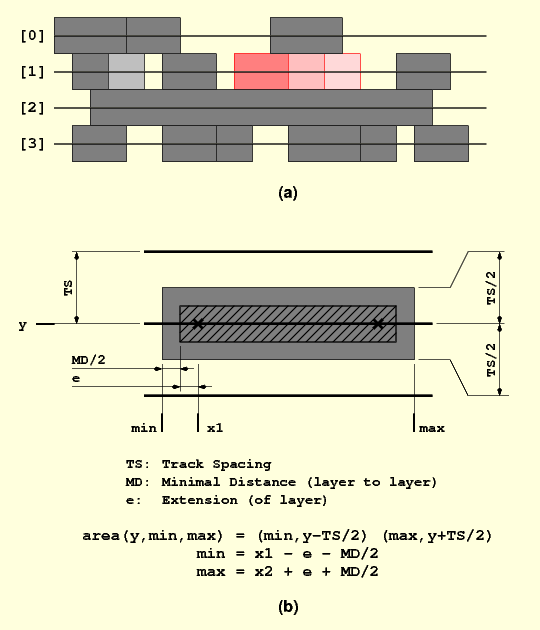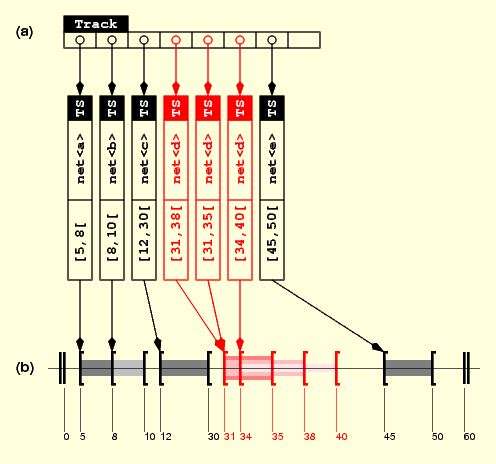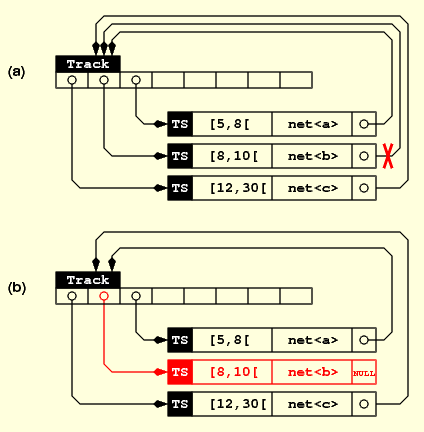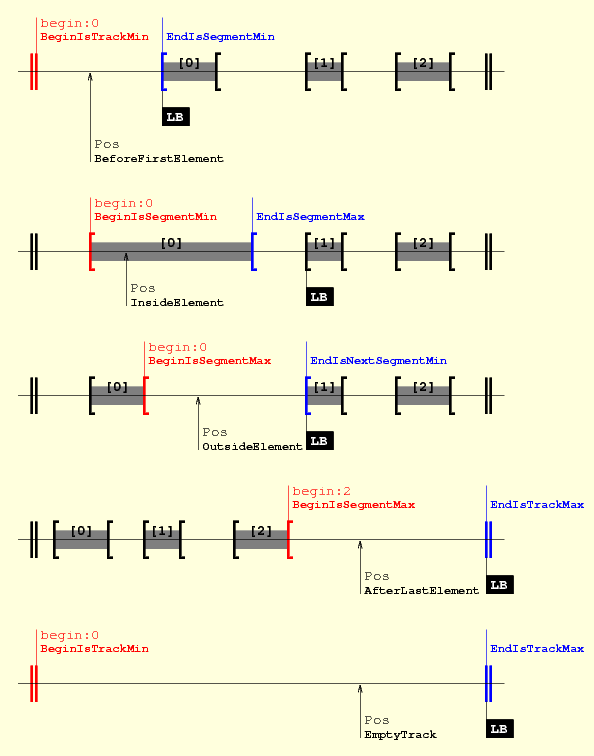Structure managing one routing track. More...

Public Types | |
| enum | IndexState { BeginIsTrackMin = 0x00000001, BeginIsSegmentMin = 0x00000002, BeginIsSegmentMax = 0x00000004, EndIsTrackMax = 0x00000008, EndIsSegmentMin = 0x00000010, EndIsNextSegmentMin = 0x00000020, EndIsSegmentMax = 0x00000040, BeforeFirstElement = BeginIsTrackMin |EndIsSegmentMin, InsideElement = BeginIsSegmentMin|EndIsSegmentMax, OutsideElement = BeginIsSegmentMax|EndIsNextSegmentMin, AfterLastElement = BeginIsSegmentMax|EndIsTrackMax, EmptyTrack = BeginIsTrackMin |EndIsTrackMax, BeginMask = BeginIsTrackMin |BeginIsSegmentMin|BeginIsSegmentMax, EndMask = EndIsTrackMax |EndIsSegmentMin |EndIsNextSegmentMin|EndIsSegmentMax } |
Public Member Functions | |
| virtual bool | isHorizontal () const =0 |
| virtual bool | isVertical () const =0 |
| bool | isLocalAssigned () const |
| RoutingPlane * | getRoutingPlane () const |
| KiteEngine * | getKiteEngine () const |
| virtual unsigned int | getDirection () const =0 |
| size_t | getIndex () const |
| unsigned int | getDepth () const |
| const Layer * | getLayer () const |
| const Layer * | getBlockageLayer () const |
| DbU::Unit | getAxis () const |
| DbU::Unit | getMin () const |
| DbU::Unit | getMax () const |
| Track * | getNextTrack () const |
| Track * | getPreviousTrack () const |
| size_t | getSize () const |
| virtual Point | getPosition (DbU::Unit coordinate) const =0 |
| TrackElement * | getSegment (size_t index) const |
| TrackElement * | getSegment (DbU::Unit position) const |
| TrackElement * | getNext (size_t &index, Net *) const |
| TrackElement * | getPrevious (size_t &index, Net *) const |
| TrackElement * | getNextFixed (size_t &index) const |
| size_t | find (const TrackElement *) const |
| DbU::Unit | getSourcePosition (vector< TrackElement *>::iterator) const |
| DbU::Unit | getMinimalPosition (size_t index, unsigned int state) const |
| DbU::Unit | getMaximalPosition (size_t index, unsigned int state) const |
| Interval | getFreeInterval (DbU::Unit position, Net *net=NULL) const |
| Interval | getOccupiedInterval (size_t &begin) const |
| Interval | expandFreeInterval (size_t &begin, size_t &end, unsigned int state, Net *) const |
| void | getBeginIndex (DbU::Unit position, size_t &begin, unsigned int &state) const |
| void | getOverlapBounds (Interval, size_t &begin, size_t &end) const |
| TrackCost | getOverlapCost (Interval, Net *, size_t begin, size_t end, unsigned int flags) const |
| TrackCost | getOverlapCost (Interval, Net *, unsigned int flags) const |
| TrackCost | getOverlapCost (TrackElement *, unsigned int flags) const |
| void | getTerminalWeight (Interval, Net *, size_t &count, unsigned int &weight) const |
| DbU::Unit | getSourcePosition (size_t index) const |
| bool | check (unsigned int &overlaps, const char *message=NULL) const |
| void | invalidate () |
| void | insert (TrackElement *) |
| void | insert (TrackMarker *) |
| void | setSegment (TrackElement *, size_t) |
| size_t | doRemoval () |
| void | doReorder () |
Static Public Attributes | |
| static const size_t | npos = (size_t)-1 |
Detailed Description
Structure managing one routing track.
Track Purpose
We use an array of regularly spaced Track as a geometrical fast access structure. It allows to know whether an area is used or not. The whole area may be seen as a set of adjoining tiles of fixed width but variable length.
The figure (1.b) show, for an horizontal, track the relation between y,min,max and the occupied area of the plane. min and max must take into account segment extensions (e) and the minimal distance between two rectangles (MD) of the same layer. We assume that the width of the segment, augmented of all it's contraints is no greater than TS (in fact it's how TS must be calculated).
For the whole track array, see RoutingPlane.

Track Implementation
A Track is implemented with a sorted vector of TrackElement. TrackElements from differents nets must not overlap. The sorting order is defined as follow:
- TrackElements are sorted by increasing source (min) positions.
- In case of overlap (i.e. belongs to the same net), if they share the same source position, then they are sorted by decreasing length. This way, the longest one will be the first encountered when walking through the Track in increasing index order.
Figure 2.b shows the details of the Track [1] of figure 1.a. Net <d> show an exemple of overlapping.

In addition to the TrackSegments, the Track also manage additionnal informations through a second vector of TrackMarkers. TrackMarker are currently used only to hints at how strongly a terminal is dependant on that portion of Track to be accessed.
Indexes vs. Iterators
Numerical indexes have been prefered over iterators because they can be used more easily by objects other the Track itself for referencing. So internal managment follow the same rule, handling indexes or reference to indexes.
Update Mechanism
When a TrackElement is normaly inserted in a Track, a two way link is established. The Track has an entry in it's vector refering to TrackElement, and conversely, the TrackElement has it's track field pointing to it's owning Track.
TrackElement Removal
To remove a TrackElement from a Track, we break one of those two links: the TrackElement cease to refer to the owning Track, marking him for removal which will occurs at the next track revalidation (Track::doRemoval()). In figure 3, the TrackElement belonging to net <b> is marked for removal.

TrackElement Insertion
When a TrackElement is inserted into a Track, the two way link is immediatly created (but the TrackElement is not yet at it's final place in the Track's vector). Before inserting a TrackElement we check that it's been already detached (track field to NULL).
It is at that step that the TrackElement axis is actually updated through a call to TrackElement::setAxis().
Revalidation Sequence
After a Track has been modificated either the Track element vector or the MarkerElement vector (or both) has been invalidateds. Revalidation take place in three steps:
- Track::doRemoval(), remove all TrackElement marked for removal.
- Track::insert(), insert the TrackElement into their new Track.
- Track::doReorder(), sort the TrackElement of the vector, that is, put the newly inserted elements at their right place.
Each step must be done for all Tracks before proceeding to the next. This way a TrackElement track field doesn't get set before it has been actually removed from it's previous Track.
Main Operations on Tracks
Helper Function: Track::getBeginIndex()
Return in begin the index of the TrackElement whose minimum is immediately below the requested position on the Track axis. The second returned parameter state is a set of flags to tell how the begin index has to be interpreted.
Helper Function: Track::getOccupiedInterval()
Returns the complete interval of a set of overlapping TrackElement from the same net.
Member Enumeration Documentation
◆ IndexState
| enum IndexState |
Indicates how to compute the bounds of the interval enclosing a given position on track axis.
- Note
- According to position, the interval can be a free interval or a used interval.
| Enumerator | |
|---|---|
| BeginIsTrackMin | (implies |
| BeginIsSegmentMin | The |
| BeginIsSegmentMax | The |
| EndIsTrackMax | There is no TrackElement after |
| EndIsSegmentMin | The |
| EndIsNextSegmentMin | The |
| EndIsSegmentMax | The |
| BeforeFirstElement | the |
| InsideElement | the |
| OutsideElement | the |
| AfterLastElement | the position is after the end of the last element. |
| EmptyTrack | the track is still empty. |
| BeginMask | To extract the begin part from a combination of flags. |
| EndMask | To extract the end part from a combination of flags. |
Member Function Documentation
◆ isHorizontal()
|
pure virtual |
Returns: true if the Track in horizontal direction.
Implemented in HorizontalTrack, and VerticalTrack.
Referenced by TrackFixedSegment::isHorizontal().
◆ isVertical()
|
pure virtual |
Returns: true if the Track in vertical direction.
Implemented in HorizontalTrack, and VerticalTrack.
Referenced by TrackFixedSegment::isVertical().
◆ isLocalAssigned()
|
inline |
Returns: true is the Track should be preferentially used for local routing.
◆ getRoutingPlane()
|
inline |
Returns: The RoutingPlane owning this Track.
Referenced by Track::getNextTrack(), and Track::getPreviousTrack().
◆ getKiteEngine()
| KiteEngine * getKiteEngine | ( | ) | const |
Returns: The KiteEngine owning this Track.
◆ getDirection()
|
pure virtual |
Returns: The direction of the Track, either Katabatic::KbHorizontal or Katabatic::KbVertical.
Implemented in HorizontalTrack, and VerticalTrack.
Referenced by TrackFixedSegment::getDirection().
◆ getIndex()
|
inline |
Returns: The index of this Track in the RoutingPlane Track vector.
Referenced by Track::check(), Track::getNextTrack(), and Track::getPreviousTrack().
◆ getDepth()
| unsigned int getDepth | ( | ) | const |
Returns: The depth (as given by the RoutingGauge) of the Track's layer.
◆ getLayer()
| Layer * getLayer | ( | ) | const |
Returns: The Layer of the Track.
Referenced by Track::insert().
◆ getBlockageLayer()
| Layer * getBlockageLayer | ( | ) | const |
Returns: The associated blockage Layer to the Track's layer.
Referenced by Track::insert().
◆ getAxis()
|
inline |
Returns: The Axis of the Track.
Referenced by Track::check(), NegociateWindow::createTrackSegment(), TrackFixedSegment::getAxis(), VerticalTrack::getPosition(), HorizontalTrack::getPosition(), Track::insert(), RoutingEvent::revalidate(), Manipulator::ripupPerpandiculars(), and SegmentFsm::SegmentFsm().
◆ getMin()
|
inline |
Returns: The minimal allowed coordinate of the Track.
Referenced by Manipulator::minimize().
◆ getMax()
◆ getNextTrack()
| Track * getNextTrack | ( | ) | const |
Returns: The next Track in the RoutingPlane vector. That is the one with the axis immediatly superior.
Referenced by NegociateWindow::createTrackSegment(), RoutingEvent::revalidate(), and Manipulator::ripupPerpandiculars().
◆ getPreviousTrack()
| Track * getPreviousTrack | ( | ) | const |
Returns: The previous Track in the RoutingPlane vector. That is the one with the axis immediatly inferior.
Referenced by NegociateWindow::createTrackSegment().
◆ getSize()
|
inline |
Returns: The total number of TrackSegment in the Track.
Referenced by Track::getMaximalPosition(), and Track::getSegment().
◆ getPosition()
Returns: the point at (position,getAxis()) for horizontal Track at or (getAxis(),position) for vertical Track.
Implemented in HorizontalTrack, and VerticalTrack.
◆ getSegment() [1/2]
| TrackSegment * getSegment | ( | size_t | index | ) | const |
- Parameters
-
index The index of the TrackSegment.
- Returns
- The TrackSegment at index. The result will be
NULLin the follwing cases :- index is outside the sorted zone.
- index points to a hole in the Track.
- index is equal to Track::npos.
Referenced by SegmentFsm::conflictSolveByPlaceds(), NegociateWindow::createTrackSegment(), SegmentFsm::desaturate(), Manipulator::forceOverLocals(), Manipulator::forceToTrack(), Track::getSegment(), Manipulator::insertInTrack(), Manipulator::makeDogleg(), Manipulator::minimize(), and Manipulator::shrinkToTrack().
◆ getSegment() [2/2]
| TrackSegment * getSegment | ( | DbU::Unit | position | ) | const |
- Parameters
-
position The position where to search.
- Returns
- The TrackSegment whose starting point is immediatly inferior to position.
◆ getNext()
| TrackSegment * getNext | ( | size_t & | index, |
| Net * | net | ||
| ) | const |
- Parameters
-
index Index of the starting TrackSegment. net A Netto ignore.
- Returns
- The next TrackSegment (
NULLif not found).
Find, starting from TrackSegment at index the next TrackSegment ignoring TrackSegment from net. index is modified to point on the returned TrackSegment. If there's no next TrackSegment (NULL) then index is set to Track::npos.
Referenced by Track::expandFreeInterval(), TrackFixedSegment::getNext(), TrackSegment::getNext(), TrackElement::getNext(), and Track::getNextFixed().
◆ getPrevious()
| TrackSegment * getPrevious | ( | size_t & | index, |
| Net * | net | ||
| ) | const |
- Parameters
-
index Index of the starting TrackSegment. net A Netto ignore.
- Returns
- The previous TrackSegment (
NULLif not found).
find, starting from TrackSegment at index the previous TrackSegment ignoring TrackSegment from net. index is modified to point on the returned TrackSegment. If there's no previous TrackSegment (NULL) then index is set to Track::npos.
Referenced by Track::expandFreeInterval(), TrackFixedSegment::getPrevious(), TrackSegment::getPrevious(), and TrackElement::getPrevious().
◆ getNextFixed()
| TrackSegment * getNextFixed | ( | size_t & | index | ) | const |
- Parameters
-
index Index of the starting TrackSegment.
- Returns
- The first previous Fixed TrackSegment.
find, starting from TrackSegment at index the first previous with a Fixed attribute set. index is modified to point on the returned TrackSegment. If there's no previous TrackSegment (NULL) then index is set to Track::npos.
◆ find()
| size_t find | ( | const TrackElement * | element | ) | const |
Returns: the index of element inside the Track. If the element do not belongs to the Track, return Track::npos.
◆ getSourcePosition() [1/2]
| DbU::Unit getSourcePosition | ( | vector< TrackElement *>::iterator | it | ) | const |
Returns: The source position of TrackSegment pointed by iterator it. If it is equal to end() , returns zero.
◆ getMinimalPosition()
| DbU::Unit getMinimalPosition | ( | size_t | index, |
| unsigned int | state | ||
| ) | const |
Returns: Extract the minimal position from the interval at index in accordance to state hinting.
See also: Track::IndexState.
◆ getMaximalPosition()
| DbU::Unit getMaximalPosition | ( | size_t | index, |
| unsigned int | state | ||
| ) | const |
Returns: Extract the maximal position from the interval at index in accordance to state hinting.
See also: Track::IndexState.
Referenced by Track::expandFreeInterval().
◆ getFreeInterval()
- Parameters
-
position where fo find a free interval. net for which net to find the free interval. Returns: The longuest free interval enclosing position (may be empty).
◆ getOccupiedInterval()
| Interval getOccupiedInterval | ( | size_t & | begin | ) | const |
- Parameters
-
begin index of one of the TrackElement set. May be modificated. Returns: the whole interval used by a set of overlaping TrackSegment.
As TrackElement from a same net can overlap, the interval of one of them do not give the full extend of the Track occupation at this point. This function looks for all overlaping segments and returns the merged interval. Additionnaly it sets begin to the index of the lowest TrackElement of the set.

Referenced by Track::expandFreeInterval(), Track::getBeginIndex(), and Track::getOverlapBounds().
◆ expandFreeInterval()
- Parameters
-
begin the lowest used TrackSegment. end the highest used TrackSegment. state tells how to interpret the begin&endindexes.net the for wich we seek place. Returns: The longuest free interval between ]begin,end[ .
Starting from the initial [begin,end] interval, expand the interval to encompass all free space or segments belonging to net. state may be used to compute the interval bounds from begin and end instead of directly using the returned interval.
- Note
]begin,end[ must define a free interval between two TrackSegment.
Referenced by Track::getFreeInterval().
◆ getBeginIndex()
| void getBeginIndex | ( | DbU::Unit | position, |
| size_t & | begin, | ||
| unsigned int & | state | ||
| ) | const |
- Parameters
-
position The position where to search. begin Index of the immediatly inferior TrackElement. state how to interpret the returned begin.
Return in begin the index of the TrackElement whose minimum is immediately below the requested position on the Track axis. The second returned parameter state is a set of flags to tell how the begin index has to be interpreted.
Flags for the state are:
- Track::BeginIsTrackMin : (implies
begin=0) there is no TrackElement beforeposition. - Track::EndIsSegmentMin : The
beginsegment starts beforeposition. - Track::BeginIsSegmentMin : The
beginsegment starts beforepositionand ends after. - Track::EndIsSegmentMax : The
beginsegment starts beforepositionand ends after. - Track::BeginIsSegmentMax : The
beginsegment starts and ends beforeposition. - Track::EndIsNextSegmentMin : The
beginsegment starts and ends beforeposition. So the maximum is given by theminimumof the next TrackElement. - Track::EndIsTrackMax : There is no TrackElement after
position.
Based on the previous flags, we build the state parameter:
- Track::BeforeFirstElement : the
positionis before the first TrackElement. - Track::InsideElement : the
positionis inside a TrackElement. - Track::OutsideElement : the
positionis in free zone between two TrackElements. - Track::AfterLastElement : the position is after the end of the last element.
- Track::EmptyTrack : the track is still empty.
To separate flags relevant to begin and end informations, two masks are provideds:

Reminder for myself: The Track::getBeginIndex() function relies on the STL lower_bound() function. lower_bound() finds the TrackElement immediately superior to position (shown on Figure 3 by the LB label in white on black).
The relation between the returned begin index and the position is given through the state parameter.
Referenced by Track::getFreeInterval(), Track::getOverlapBounds(), and Track::getSegment().
◆ getOverlapBounds()
| void getOverlapBounds | ( | Interval | interval, |
| size_t & | begin, | ||
| size_t & | end | ||
| ) | const |
- Parameters
-
interval the overlaping interval. begin where to store the starting bound. end where to store the ending bound.
find the range of TrackSegment intersecting interval. Note that when the interval lower bound crosses a set of overlaping intervals from the same Net, the interval at begin will crosses the lower bound but some following of the same Net may not.
Referenced by NegociateWindow::createTrackSegment(), and Track::getOverlapCost().
◆ getOverlapCost() [1/3]
| TrackCost getOverlapCost | ( | Interval | interval, |
| Net * | net, | ||
| size_t | begin, | ||
| size_t | end, | ||
| unsigned int | flags | ||
| ) | const |
- Parameters
-
interval the overlaping interval. net a Net to ignore (null cost). begin the starting bound. end the ending bound. flags passed to the overlap cost function.
- Returns
- The cost of the overlap.
Compute the cost of the overlap of interval with the range [begin,end] of TrackSegment. Any TrackSegment belonging to net will be ignored.
Referenced by Track::getOverlapCost().
◆ getOverlapCost() [2/3]
- Parameters
-
interval the overlaping interval. net a Net to ignore (null cost). flags passed to the overlap cost function.
Compute the overlap cost of interval with TrackSegment from the current Track, ignoring thoses belonging to net.
◆ getOverlapCost() [3/3]
| TrackCost getOverlapCost | ( | TrackElement * | segment, |
| unsigned int | flags | ||
| ) | const |
- Parameters
-
segment under which to compute overlap cost. flags passed to the overlap cost function.
Compute the overlap cost of segment with TrackSegment from the current Track (interval and net are deduced from segment).
◆ getTerminalWeight()
| void getTerminalWeight | ( | Interval | interval, |
| Net * | net, | ||
| size_t & | count, | ||
| unsigned int & | weight | ||
| ) | const |
- Parameters
-
interval under which to compute terminal weight. net a net to be ignored. count incremented of the number of track markers under the interval.weight incremented of the sum of the weight of the track markers under the interval.
Compute and return the sum of the weight of the track markers (see TrackMarker) under interval ignoring net (that is, for net).
- Remark: The referenced variables
countandweightare not reset to - zero by this function. It is of the caller's responsability.
◆ getSourcePosition() [2/2]
| DbU::Unit getSourcePosition | ( | size_t | index | ) | const |
Returns: The source position of TrackSegment at index index. If index is equal to Track::npos, returns zero.
◆ check()
| bool check | ( | unsigned int & | overlaps, |
| const char * | message = NULL |
||
| ) | const |
- Parameters
-
overlaps The number of overlaping segments. message An iformative message, only printed if an error occurs.
- Returns
- true if the Track contains no incoherencies.
Perform a complete Track check. Looks for the following incoherencies :
- TrackSegment do not refers this Track.
- TrackSegment is detached (TrackSegment::getTrack() is
NULL). - TrackSegment is hollow, this one is very unlikely as hollow TrackSegment are only created for the
lower_bound(). NULLpointers (should never occurs, nevertheless...)- Two consecutive TrackSegment from different
Netmust not overlap. - For TrackSegment starting from the same position, the longuest must be first.
◆ invalidate()
| void invalidate | ( | ) |
◆ insert() [1/2]
| void insert | ( | TrackElement * | segment | ) |
Adds segment to the Track. Must only be used inside a Session. They must appears after Track::doRemoval() and before Track::doReorder().
See also: Kite::Session.
◆ insert() [2/2]
| void insert | ( | TrackMarker * | marker | ) |
Adds marker to the Track. Must only be used inside a Session.
See also: Kite::Session.
◆ setSegment()
| void setSegment | ( | TrackElement * | element, |
| size_t | index | ||
| ) |
Directly affect the Track entry at position index to element (use with great care).
See also: Kite::Session.
Referenced by TrackSegment::swapTrack().
◆ doRemoval()
| size_t doRemoval | ( | ) |
Returns: The number of removeds TrackSegment.
Suppress all the TrackSegment that have been withdraw from the Track. TrackSegment must be withdraw trough the TrackSegment::detach() method which sets their owning Track to NULL (the removal criterion). It uses the STL remove_if algorithm that put all the to be removed elements at the end of the vector.
See also: Kite::Session.
◆ doReorder()
| void doReorder | ( | ) |
(Re)sort the TrackElement of the vector. Must be called after:
- Track::doRemoval() so no detached TrackSegment are presents.
- All calls to Track::insert(), as the newly inserted elements are put at the back of the vector.
See also: Kite::Session.
Member Data Documentation
◆ npos
|
static |
A special index value (greatest integer) meaning that an index is invalid.
Referenced by Track::expandFreeInterval(), Track::find(), Track::getNext(), Track::getOccupiedInterval(), Track::getOverlapBounds(), Track::getOverlapCost(), Track::getPrevious(), Track::getSegment(), and Track::getSourcePosition().
The documentation for this class was generated from the following files:
- Track.h
- Track.cpp
- Track.dox